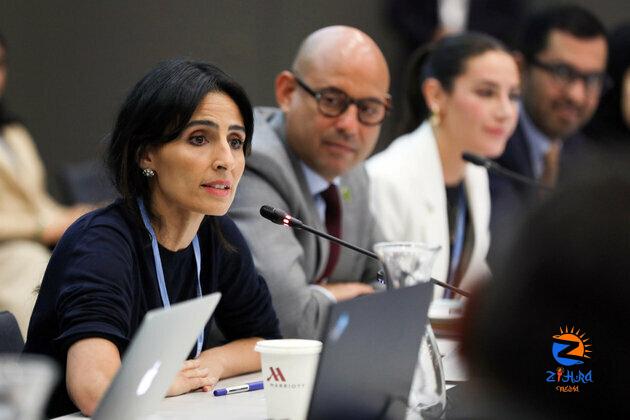
[ad_1]
Thu 08-06-2023 18:27 PM
BONN, Germany, 8th June, 2023 (WAM) — Razan Al Mubarak, UN Climate Change High-Level Champion for the COP28 Presidency, is advocating for more robust voluntary climate actions by the private sector, local governments and civil society at the Bonn Climate Change Conference this week.
Held from 5th-15th June, the event is part of the formal United Nations negotiations on climate and marks an important stop on the road to the high-level UN Climate Change Conference (COP28) which will take place in the UAE this December.
The Bonn conference is expected to make progress on several critical issues, including the operational details of a Loss and Damage Fund created last year to compensate victims of flooding, sea-level rise and other extreme events brought on by climate change. Also on the agenda will be the Global Stocktake, an official assessment, to be unveiled in the coming months, of how well the world is doing in tackling the climate challenge. On this and other key issues, experts in Bonn will be working to prepare draft texts for adoption at COP28.
Decisions at the yearly COP meetings are legally binding and are adopted by all parties signatories to the United Nations Framework Convention on Climate Change. At present, there are 199 parties: 198 governments and one regional organisation, the European Union.
As the UN Climate Change High-Level Champion for COP28, Al Mubarak is working to inspire and unite non-state actors to do their part. Such voluntary actions are urgently needed.
“This is a decisive decade, a decisive year for tackling climate change. It is about asking ourselves how much we are prepared to do now to secure a safe, healthy, prosperous future for ourselves and our children,” said Al Mubark. “To avoid the most painful and costly climate change impacts, we must halve global emissions by 2030. We are far off track but it is still not too late to act in a meaningful way.”
Indeed, coming out ahead of COP28, the Global Stocktake report is expected to show that the world is lagging in implementing the Paris Agreement and achieving its goal to limit human-induced warming to 1.5C above pre-industrial levels.
“An emergency of this kind requires a solution that embraces and uses talent from the whole of society,” said Al Mubarak. “Alongside government action, we need a groundswell of action by businesses, cities, non-governmental organisations, indigenous peoples, youth and women.”
Together with Dr. Mahmoud Mohieldin, UN Climate Change High-Level Champion for COP27, Al Mubarak will connect the work of governments with the many voluntary and collaborative climate actions taken by cities, regions, businesses and investors and discuss how to increase the accountability of such actions.
“My priority is to drive action against all three pillars of Paris: climate mitigation, adaptation and finance,” said Al Mubarak, whose program in Bonn includes bilateral meetings with some of the main negotiating blocks that represent the interests of different groups of countries in the UN climate talks, and several public events with leaders in business and finance, representatives of local governments, observers and activists all in attendance.
Parallel to the technical discussions about the workings of the Loss and Damage Fund, Al Mubarak and Dr. Mahmoud Mohieldin will hold an event, Actions After Impacts, on 9th June in Bonn, where they will highlight examples of work already underway by non-state actors helping vulnerable communities affected by extreme climate events.
Another session, held on 12th June, will focus on the Sharm El Sheikh Adaptation Agenda. Agreed in Egypt last year, this is the first global plan to unite actions by countries and non-state actors. A focus on adaptation is crucial because even if the world manages to limit warming to no more than 2C or 1.5C and avert the worst climate-change impacts, some adverse effects are inevitable. In addition, many countries with already limited public resources are among the most vulnerable to climate hazards like extreme temperatures, cyclones, droughts and floods.
The Sharm El Sheikh Adaptation Agenda has set out 30 targets to advance planning and finance to improve adaptation efforts in five areas: food, water, oceans, human settlements and infrastructure. The event held by Al Mubarak and Dr. Mohieldin will present task forces, define their priorities and begin to mobilise action and finance.
On the mitigation front, the High-Level Champions are working to have more public and private entities join the Race to Zero campaign to help decarbonise the world economy. Participants pledge to reach net zero by 2050 at the latest and are expected to publish annual progress reports.
Another key priority is promoting nature-based solutions, said Al Mubarak, who is also President of the International Union for Conservation of Nature (IUCN) and Managing Director of the Environment Agency – Abu Dhabi and the Mohamed bin Zayed Species Conservation Fund.
“We know there will be no resilient, net zero future without halting and restoring nature loss,” she said.
In this regard, one critical step is eliminating commodity-driven deforestation in company supply chains and financial institutions’ portfolios. Another is scaling up finance for bankable nature-based solutions such as mangroves that soak up carbon, shield coastal communities against storms and rising tides and sustain local livelihoods. At the same time, the efforts to protect nature and biodiversity and boost climate resilience need to be inclusive, said Al Mubarak.
“We need to put those on the frontline of climate change at the heart of the solution,” she said. “Women, indigenous communities and small island states – their perspectives are important not just because of inclusivity but because without them any solutions will be partial.”
Source: WAM
[ad_2]